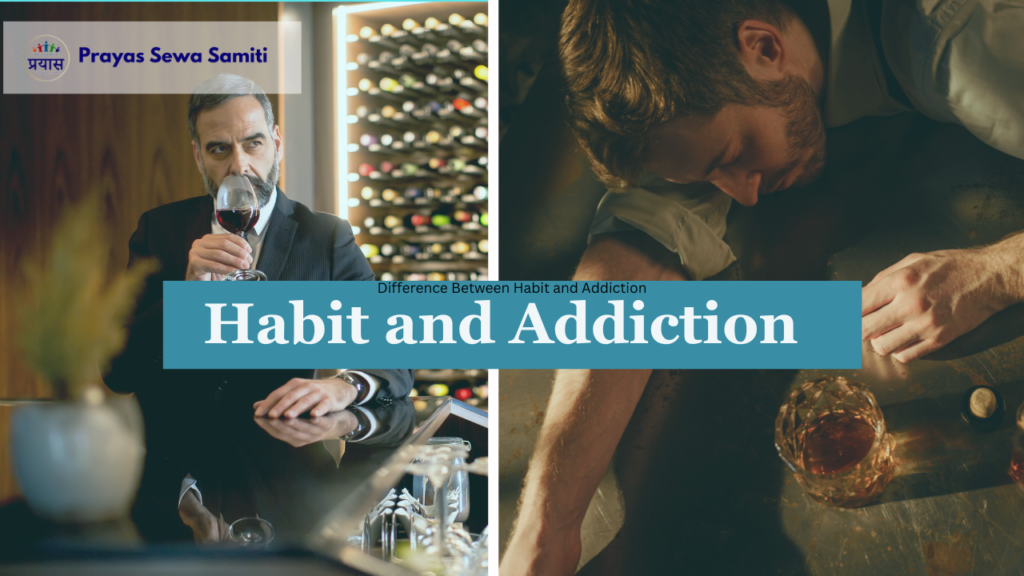Difference Between Habit and Addiction 2025: Science & Symptoms

Understanding the difference between habit and addiction is essential for identifying harmful behaviours and making informed lifestyle choices. While habits are often harmless routines, addictions can have serious physical, emotional, and social consequences. This article explains the key differences, provides examples, and guides readers on how to recognise the signs of addiction.
What is the Difference Between Habit and Addiction?
Many people use the terms “habit” and “addiction” interchangeably, but they are fundamentally different. A habit is a routine behaviour repeated regularly and often unconsciously. An addiction, on the other hand, is a compulsive need for a substance or activity despite harmful consequences. Understanding this difference is crucial in evaluating personal behaviours and taking steps towards healthy living.
Definitions: Habit vs. Addiction
Habit:
A habit is a learned behaviour that becomes automatic over time. Habits can be positive, like brushing your teeth daily, or negative, like biting your nails. Habits are generally under your control and can be changed with conscious effort.
Examples of Habits:
-
Drinking coffee every morning
-
Checking your phone before bed
-
Taking a walk after dinner
Addiction:
Addiction is a psychological and physical inability to stop consuming a chemical, drug, activity, or substance, even though it causes harm. It involves changes in the brain’s reward system and usually requires professional help to overcome.
Examples of Addictions:
-
Smoking cigarettes
-
Alcohol or drug dependency
-
Gambling
-
Internet or video game addiction

Key Differences Between Habit and Addiction
Understanding the difference between habit and addiction involves looking at several key areas:
1. Control
Habit: You can choose to stop or change it without significant distress. Habits are often conscious choices that can be redirected with effort and motivation. They usually do not overpower your decision-making ability.
Addiction: Stopping leads to withdrawal symptoms, anxiety, or intense cravings. Addictions dominate your behaviour and override logic, making it difficult to resist the urge even when you want to.
2. Impact on Daily Life
Habit: Usually doesn’t interfere with daily functioning. It fits into your routine without causing disruption or emotional turmoil.
Addiction: Often disrupts work, relationships, health, and responsibilities. Addictive behaviours tend to consume your time and energy.
3. Awareness
Habit: People are often aware of their habits. They may notice when or why they engage in them and can reflect on them easily.
Addiction: May involve denial or lack of insight into the severity of the problem. The individual may hide the behaviour or downplay its impact.
4. Psychological and Physical Dependence
Habit: Typically psychological. The mind associates certain behaviours with comfort or routine, but there’s no intense physical craving.
Addiction: Often both psychological and physical, leading to dependency. The body and mind crave the substance or action, making it difficult to quit.
5. Consequences
Habit: Generally low risk. Most habits don’t lead to serious problems unless they become excessive.
Addiction: High risk, including legal, health, and financial issues. Addiction can escalate quickly, affecting all areas of life.
When a Habit Becomes an Addiction
Sometimes, a habit can evolve into an addiction. For example, having a drink to relax after work may become daily heavy drinking that affects your health and relationships. This transition is often subtle and gradual.
Warning Signs That a Habit is Becoming an Addiction:
-
Inability to stop even when you want to
-
Spending excessive time on the activity
-
Neglecting responsibilities
-
Using the activity to escape problems
-
Experiencing withdrawal symptoms when trying to stop
Recognising these signs early can help prevent long-term harm.
Psychological Perspective
From a psychological point of view, habits are formed through repetition and reinforcement. The brain creates neural pathways that make the behaviour automatic. In addition, however, the brain’s reward system is hijacked, leading to compulsive behaviour driven by cravings and a false sense of reward.
Therapists often use Cognitive Behavioural Therapy (CBT) to address both habits and addictions. While habits may be adjusted with simple behavioural changes, addiction typically requires deeper intervention and support.

How to Break a Habit vs. Overcoming an Addiction
Breaking a Habit:
-
Awareness: Identify the trigger and behaviour. Understanding the root cause of a habit helps manage it more effectively. Being mindful of when and why the habit occurs is key.
-
Replacement: Substitute with a healthier behaviour. Choosing a positive alternative can redirect your actions and reinforce new routines.
-
Consistency: Repetition helps build new habits. Regular practice strengthens the new behaviour until it becomes second nature.
-
Support: Encourage feedback from friends or use habit-tracking apps. Positive reinforcement from others can boost motivation and accountability.
Overcoming an Addiction:
-
Professional Help: Consult doctors or counsellors. Addiction often requires structured treatment plans and expert guidance.
-
Detoxification: In cases of substance addiction. The body needs time and medical care to eliminate harmful substances safely.
-
Therapy: CBT, group therapy, or rehab programs. Therapy helps address the underlying emotional triggers and behavioural patterns.
-
Support Groups: Like Alcoholics Anonymous or Narcotics Anonymous. Connecting with others facing similar struggles provides strength and a sense of community.
Why Understanding the Difference Matters
Knowing the difference between habit and addiction helps in:
-
Making informed choices
-
Seeking timely help
-
Avoiding judgment towards others
-
Creating awareness about mental health and wellness
It empowers individuals to take proactive steps towards a healthier lifestyle and opens the door for early intervention when needed.
Final Thoughts
The difference between habit and addiction might seem similar on the surface, but they have drastically different impacts on your life. A habit is typically manageable and reversible, while addiction often requires medical and psychological intervention. If you or someone you know is struggling, recognising the difference is the first step towards recovery.
Being informed allows us to take better control of our actions and support others without stigma. Always consult professionals if you’re unsure whether a behaviour is a habit or an addiction. If you or a loved one needs support, Prayas Sewa Samiti, the best rehab centre in Dehradun, is here to help with compassionate care and expert guidance for addiction recovery.